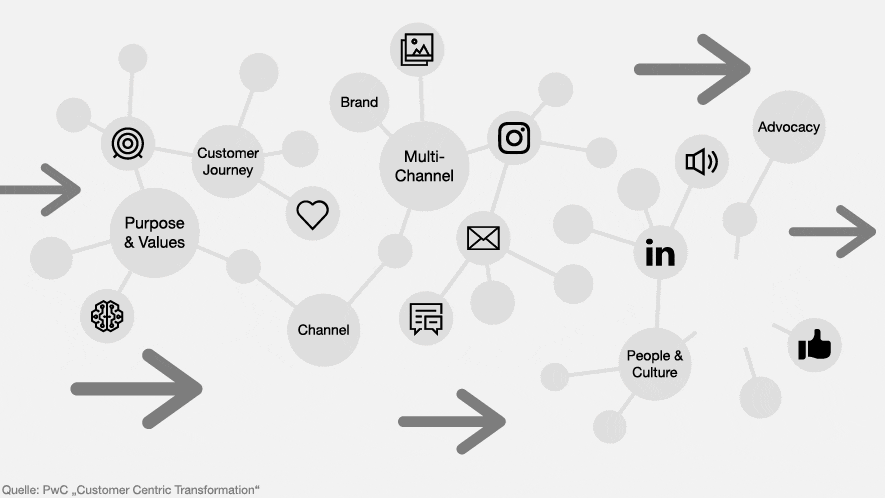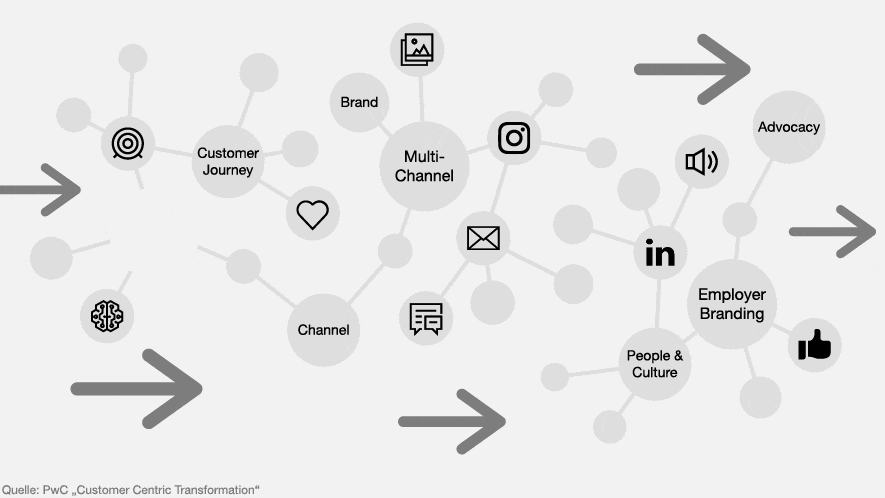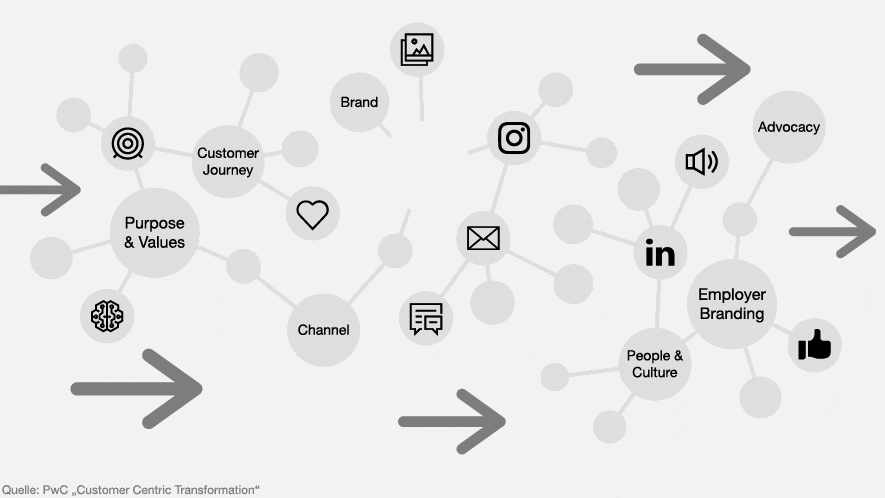Brand management and communication as part of your transformation
Rapidly changing markets and customer needs as well as new digital channels increasingly put a brand’s identity to the test and make brand management more complex.
In order to achieve a sustainable brand transformation, it is necessary to make intelligent use of emerging opportunities and to translate your brand’s values into the digital world.
It is becoming more important for brands to adjust their position and range of services throughout the entire customer journey of their target audiences.
Authentic and strategically sound communication as well as taking a position on social issues have now become basic components of any holistic marketing planning.
To the viewpoint
Branding & transformation
Our process for holistically transforming your brand
The roof of your new “House of Brand & Communication” is the brand itself. In order to differentiate yourself from the competition and position yourself clearly for your target group, it is vital that your strategic branding position clearly defines the core aspects of your brand.
This means that the purpose and values of a brand need to be embedded in your business strategy and guide actions throughout your company.
Your brand will be created and developed by correctly understanding your target audience, your market and the competition as well as by selecting a suitable communication strategy with the right branded content. Your brand will ultimately be brought to life through specific 360° campaign planning and by selecting the right technologies for implementing these plans.
An effective and agile organizational structure that provides the right mindset for your brand as well as your brand transformation and communication measures will serve as the operational foundation for your new brand approach.
- Brand management
- Target group, market and competition
- Communication strategy and branded content
- Campaign planning and implementation
- Marketing organisation and operating model
The most critical questions in brand transformation
Erfolgreiche Markenführung ist das Ergebnis des Zusammenspiels zwischen der Erkenntnis über Zielgruppen- und Marktbedürfnisse, einer wohldurchdachten und flexiblen Zielsetzung und Positionierung sowie der reibungslosen Umsetzung in Prozesse und Kommunikation. Dabei sollte die Kommunikation auf die Erwartungen der Konsumenten ausgerichtet sein, vorhandene Anwendungen und Infrastrukturen modernisiert und Daten & Abläufe gezielt auf den Konsumenten abgestimmt werden.
Any questions?
Contact PwC’s Brand Transformation & Communications Team
Our case studies
- Communication strategy
- Marketing operating model
- Target operating model
- Supplier diversity strategy
- Brand communication
Communication strategy
Development of an internal communication strategy for the management of a domestic appliance manufacturer with international operations
Initial situation and challenges
The starting point for our customer was that after it commenced an internal transformation project to implement a global IT system at all its business premises, it was necessary to make major changes to the project’s scope. This resulted in project delays and the need for damage limitation measures. Our customer therefore developed a new project approach for its adjusted objectives, which needed to be communicated internally in a sensitive manner. In order to gain the approval of the Management Board for this new approach, a holistic internal communication strategy had to be developed in order to bring all stakeholders on board while also specifically addressing individual requirements and pain points.
PwC’s approach
- Determining the requirements and pain points of relevant stakeholders in order to gain a holistic understanding of the situation
- Developing an overarching storyline on the basis of co-creation sprints with the relevant parties
- Determining a metaphorical visual language, tone and means of communication based on the previously developed storyline in order to communicate the customer’s desired narrative in a holistic manner
- Best practice recommendations for sensitive communication at management level
Results and impact
- Development of a holistic narrative for all communication measures
- Sensitive communication with the relevant groups of stakeholders in an appropriate tone and format
- Successfully persuading the management regarding a new project approach
Marketing operating model
Transforming the organisational structure of a trade fair company with global operations
Initial situation and challenges
Due to the ongoing process of digitalisation and the related changes, it was necessary for our customer – a trade fair company with international operations – to reassess and adjust its operating model to ensure future viability. Marketing campaigns were generally drawn up in various silos rather than being considered in a holistic manner. This meant that work was duplicated in some cases and there was no transparency regarding responsibilities and roles. It was necessary to redefine and standardise processes within the department as well as the relevant interfaces to other connected business divisions.
PwC’s approach
- Actual state analysis to achieve an in-depth understanding of the existing marketing landscape, roles and processes
- Maturity level analysis to identify all challenges, to determine quick wins and long-term optimisation measures and to ascertain the overall maturity level of the Marketing Communication department.
- Determining a high-level target operating model
- Identifying all relevant tasks and responsibilities (RACI) and determining efficient headcounts
- Modelling of all processes within the department as well as at the relevant interfaces.
Results and impact
- Enabling the customer to implement a holistic approach to marketing and communications and conduct state-of-the-art marketing
- Increased effectiveness and efficiency with optimised processes within the Marketing Communication department and for cooperation with additional divisions and external service providers
- Creating a new organisational structure including the relevant roles and functions
Target operating model
Restructuring of an owner-managed advertising agency in terms of holistic value creation
Initial situation and challenges
Changes in the customer portfolio and the resulting new requirements for efficient collaboration and ways of working meant that our customer – an owner-managed advertising agency – had to adjust its operating model and split up its organisational structures. Resources within the agency had previously been clustered according to individual customer groups, meaning that it was not possible to generate added value in a holistic manner. It was not possible for employees to work on different customer projects, the transfer of knowledge between individual groups was heavily impaired and competencies were therefore repeatedly developed at the agency, meaning that resource management was made more difficult.
PwC’s approach
- Actual state analysis to achieve an in-depth understanding of the existing agency landscape and organisational structure
- Workshops and interviews with selected stakeholders to identify potential areas of optimisation
- Benchmarking of relevant organisational structures at companies in the same and other sectors as well as assessment of their suitability
- Determining a high-level target operating model
- Identification of relevant roles, specifying and delineating the relevant leadership responsibilities for each role
- Development of a collaboration model, including the internal communication required, the roles involved and a comparison with existing structures
Results and impact
- Creating a competency-based organisational structure to ensure that added value is generated in a holistic manner
- Efficient distribution and management of resources throughout the entire advertising agency
- Transparency regarding all relevant business activities, responsibilities as well as a clear understanding of leadership roles
- Overview of optimised processes and ways of collaboration within the new organisational structure
Supplier diversity strategy
Supplier diversity strategy for a German automotive manufacturer
Initial situation and challenges
Our customer faced various economic, legal and social challenges. First and foremost, it was confronted with problems in its supply chain that were detrimental for its business, such as supply bottlenecks and cancellations. In addition, both legal requirements and the internal demand for a more equitable form of participation meant that there was a rising desire for transformation. Studies have shown that more diverse companies tend to be more innovative and are better positioned to show resilience within the market. They generate added value as suppliers but are often overlooked due to biases and stereotypes.
PwC's approach
- Putting a holistic supplier diversity programme in place
- Analysis of supplier data materials, identifying potential areas of optimisation as well as effective points of leverage in the procurement process
- Enablement workshops to increase awareness and sensibility around topics of diversity and inclusion
- Internal and external communication strategy to ensure the success of measures and market positioning efforts
Results and impact
- Development of a long-term supplier diversity and inclusion programme, including the implementation of two pilot projects
- Enabling employees to understand the advantages of diversity within supply chains
- Continuous adjustment of processes in procurement with a view to increasing the potential of the supplier base and safeguarding the supply chain
Brand communication
Strategic development and implementation of internal brand communication for the global integration of > 1,000 employees following a B2B merger
Initial situation and challenges
Our customer – an internationally successful B2B supply chain player – faced the challenge of holistically integrating a newly acquired logistics business division into the existing corporate organisation and brand environment. The merger included 1,000 employees at more than 15 locations in Germany and abroad who needed to be convincingly communicated with and transparently informed and motivated. A key objective for us was to provide clarity to existing employees and to promote openness towards new colleagues while also welcoming them on board in a sensitive and authentic manner, sustainably integrating them and facilitating the transfer of knowledge. Furthermore, it was necessary to familiarise them with the brand by using various communication formats.
PwC’s approach
- Project environment analysis regarding all internal and external stakeholders that had to be taken into consideration for the strategic development of internal brand communication
- Development of an overarching narrative, storyline, tone and visual language
- Development of a communication plan across all channels and touchpoints in order to address all target groups
- Determining specific core messages as well as operational development of all communication assets with the following objectives: Strategy awareness, integration support, team building, expressing appreciation, commitment
- Ensuring continuous knowledge transfer, especially with regard to the new company brand (meet and learn sessions, FAQs, playbook, etc.)
- Continuous optimisation of and rapid response to internal and external influences arising from the merger
Results and impact
- Comprehensive transfer of knowledge and sustainable onboarding of new employees within existing structures while also ensuring a shared understanding of the brand
- Effective communicative guidance for the merger, audience-specific communication with all internal groups of stakeholders as well as sustainable integration of the new employees
- Development of a blueprint for division-specific and group-wide internal communication campaigns
- Strengthening the strategic position of the internal communication
Topics of focus for long-term branding
- Diversity, equity and inclusion (DEI)
- Environment & sustainability (ESG)
- Employer Branding
- Personal branding
- Startup & Corporate
- Strategic partnerships
Diversity, equity and inclusion (DEI)
Embedding diversity, equity and inclusion (DEI) objectives in your brand and communication strategy
The diversity of our society is one of its defining characteristics. It is important to reflect this diversity in all areas of life and doing so provides companies with numerous opportunities for sustainable optimisation at various levels. Diversity, equity and inclusion are factors that will assist you in achieving lasting business success and in fully tapping into existing potential while also pushing ahead with new challenges and innovations. Greater diversity, inclusion and equitable participation have been verifiably demonstrated to have positive effects on organisational cultures and profitability.
However, how does DEI influence the relevance of your brand? How do you communicate with your customers now and how will you do so in future so that your brand has an inclusive message and is positioned within the right channels? Because your customers are just as diverse as our society and because having an authentic brand purpose is becoming increasingly important for consumers, we will assist you in dealing with these questions. We will work together with you to find the right answers and draw up a custom state-of-the-art strategy while guiding you through the analysis and adjustment of your customer communications and product positioning. We will assist you in promoting diversity, equal opportunities and inclusion at your organisation and in fully unlocking the strengths of your diverse workforce.
Environment & sustainability (ESG)
Holistically integrating sustainability into your marketing and communication strategy
Being a sustainable company means that you understand and actively manage your effects on the environment, society and corporate governance throughout your value-added chain. The ability of a company to continue generating value in future is becoming increasingly dependent on its performance under ESG criteria (environmental, social and governance).
Not only are companies being faced with stricter regulatory requirements, consumers are also attaching greater value to the sustainability of products. For this reason, many companies have started placing sustainability at the centre of their communication and branding efforts and this is making it increasingly difficult to convey a unique message with regard to this topic.
Informed stakeholders and social media are resulting in sharper awareness about brands, meaning that campaigns deemed greenwashing can quickly escalate into PR fiascos and damage brand image.
Transparent and authentic communication regarding sustainability that is in line with actual commercial practices is therefore becoming a must-have for companies across all sectors.
We will assist you in holistically integrating sustainability into your marketing and communication strategy by assessing your approach to sustainability to date, by positioning your company authentically and appropriately for your target audience in relation to sustainability and by increasing your employees’ awareness about the topic by conducting, for example, enablement workshops.
Employer Branding
Developing an authentic employer identity through employer branding
Employer branding has to provide orientation for employees and potential applicants, clearly differentiate you from other employers and highlight the values for which you stand. The German labour market currently consists of baby-boomers as well as employees from generations X,Y and Z. Each generation has its own specific needs and desires with regard to the labour market. It is the task of employers to meet these expectations and to address them in a differentiated manner. Targeted and appealing employer branding is also necessary in light of the current skills shortage and is needed in order to compete in the war of talents. Employees currently enjoy the option of choosing their preferred employer – not vice versa.
Employees also play a major role in how a company's brand is perceived and can act as an effective channel of communication. This approach is known as employee advocacy. It enables you to project an authentic image of your company – because a lived brand identity is one of the most critical factors for commercial success. Have you already tapped into the potential of your employees’ voices?

Personal branding
Using your personal brand effectively to achieve your brand goals
We link brands and branding directly to products, services and the companies that provide them. However, what has long proved successful for various products and services has started to be applied to individuals in public life. The key term here is “personal brand”. This is not a surprising development as the underlying mechanisms are generally the same. Nevertheless, there are finer points that need to be taken into account and that can potentially make a significant difference.
Personal branding is the undisputed pathway to success of our times. It can be used by both independent individuals and companies alike. Whether you are in the process of establishing a startup, are participating in a political or other initiative, or wish to tap into the voices of your company’s employees to position them as ambassadors – we will show you how you can project your brand values externally, position yourself for long-term success and thus achieve your objectives.

Startup & Corporate
Successfully positioning startups and guiding their growth
The ongoing process of digitalisation is continuing to result in immense growth opportunities for new digital business models. This has been driving developments in the startup landscape for years and the level of investment in new companies is rising continuously. The founders of such companies face a wide array of challenges. These range from recruiting talented staff and securing financing to dealing with a highly dynamic competitive environment and rapid trend cycles.
We will assist you in developing the overarching branding and vision for your startup’s market launch so that your values and core competencies are reflected.
Growth results in challenges and we will therefore provide guidance regarding your communication strategy and help you gain a foothold within the market with 360° campaign planning and strategic positioning.
In so doing, we will provide you with tailored solutions in accordance with your maturity level and in line with the current stage of your individual journey.

Strategic partnerships
Finding the right partners and strengthening your brand
Tapping into new target groups, gaining new customers and strengthening your brand image are among the key challenges currently being faced by companies and need to be considered from various perspectives. In addition to implementing conventional marketing measures, it is vital to take innovative new channels into consideration. For instance, brand collaborations, partnerships and co-branding offer opportunities to increase your brand recognition within new markets and among new target groups while bolstering your brand image. Such approaches enable you to benefit from image transfer with your branding partner.
We will assist you in identifying relevant and sustainable brand values, in tapping into suitable target groups and in finding the ideal partners for your company so that your brand retains its strong position in future. In so doing, we will work together with you to develop approaches and measures for getting the most out of your partnership and achieving your brand objectives.
Press releases and reading recommendations
“Those who move forward boldly now have the best chance of existing on the market in the long term. New business models are no longer optional – it’s becoming a must-have to meet new needs along the entire customer journey.”
Ilana Rolef-Heberling,Head of Brand Transformation, Communications & DEI at PwC GermanyContact us

Ilana Rolef-Heberling
Brand Transformation, Communications & DEI, Sustainability Services, PwC Germany






